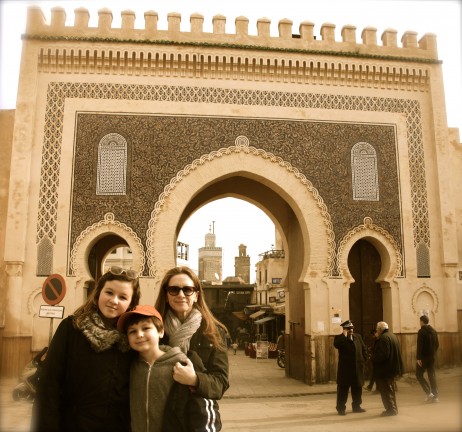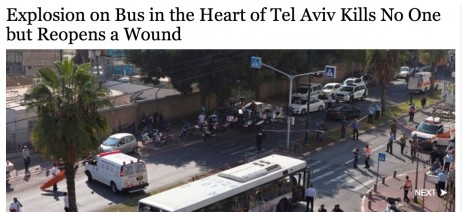It’s a funny thing about Tel Aviv. It’s probably one of the most livable cities in the world. Right up there with Sydney, or Paris, or Shanghai (on a rare clear day). But whenever people come home from Israel, they’re talking about the complex history of Jerusalem, or the pulsating politics of the country, or legendary sites like Masada. But the fact of the matter is that Tel Aviv was our favorite part of Israel, so much so that for the first week we were there we never even left town. For seventeen days, we were Tel Avivians. It’s the perfect combination of New York and LA, a great walking city on a beach. The food is world class, the people are smart and funny, the weather is terrific, and our friends lent us their awesome apartment. We couldn’t think of a reason to leave.
THE OLD CITY OF JERUSALEM
Nowhere on earth is more history packed into a single square mile. This walled city is shared uneasily by Jews, Muslims, Christians — and especially tourists, each on their own pilgrimage. Our pilgrimage led us to the Western Wall where we each scribbled a prayer. Once you’ve walked through the streets of Jerusalem and experienced the peculiar energy and tension of so many fighting for their claim to such a tiny piece of earth, the prayer you write down probably isn’t going to be just about you.
FRANNY AND FINN PRESENT PETRA
They’ve taken you to Machu Picchu. They’ve shown you the Forbidden City. Now your two intrepid young guides lead you into Jordan for a private tour of Petra, one of the New Seven Wonders of the World and unquestionably one of the most magnificent destinations we’ve encountered on the planet.
PROFILES IN CHUTZPAH: AN AMERICAN IN ISRAEL
Chutzpah (pronounced huuts-pah) is a Yiddish word that is used by Jews and non-Jews alike to describe someone who is particularly audacious or has a lot of “guts.” Meet Miriam Shler, visionary, feminist, mother, wife, pioneer, friend.
FOUR REFLECTIONS ON THE DEAD SEA
Sister: When people say the Dead Sea, I think of the crystal clear sea and the oily salt water keeping me afloat as I lay back effortlessly. It is magical how the water let me sit down like I was sitting in a chair, but there was nothing underneath me. The turquoise water was so oily against my skin, and so delightful at the same time. The dead sea is made of magic.
Brother: When you float in the Dead Sea, there’s a moment where you let go of life and watch it fall. And it feels good. But then you have to pick it back up. The weight of life returning to you. It almost feels like a jerk to the world, an unfair push back into existence, and it teaches you to admire the good moments when you still have the time.
Mother: It’s a little frightening stepping in. We have heard the warnings to not have cuts on your body or to get the water in your eyes — and for the love of God — don’t put your head under. But as you walk in and you feel the water thick with salt around your body, it is comforting. And when you bob like a cork, it feels a little enchanted. We had driven all day and were cranky and hungry, but the the Dead Sea restored us.
Father: I didn’t want to swim that day, but I did it for Finn. I waded in reluctantly. The water was cold and thick. But once my body was immersed, the spell of the salty sea took over. I was weightless, but felt totally connected… to my parents floating in the same water a generation before, to millions of others who must have made the same pilgrimage to experience the miracle of water that was heavier than they were. Israel can be a heavy place, but in the Dead Sea, all that weight just seems to disappear.
FINALLY, ISRAEL IS REAL TO US
Israel is a revelation. Though we’d read about the country for years and formulated many opinions (“There must be a two state solution!”), we never truly understood the complexities and the nuances of the country until we stepped foot there. (As a side note, we are beyond impressed how Obama struck such a perfect tone during his visit there and threaded the needle with such unsurprising precision.)
While we delayed our visit by a couple months because of rising tensions in the region, we arrived into the bosom of many passionate intellectuals, going about their lives without anxiety or fear, each with unquestionable love for their country, and (if we might read subtly between the lines) the slightest glimmer of hope for a better tomorrow.
Israelis live with an existential reality that the rest of the world doesn’t possess. Because the country was born from the horrors of the Holocaust — an explicit program to exterminate the Jewish people — the Israelis possess the notion that at any moment their country could cease to exist. As Americans, we have our share of anxieties, but none of them include the idea that one day there could be no more America. This existential reality is part of the Israeli DNA, it explains the oversize personalities we encountered, the passionate way in which they live, the fierceness in their voice when they talk about their homeland, and the tight knit bond they feel with their countrymen.
We met many young men and women who were either in the midst of their compulsory military service or on the verge of heading off to the army. Their mothers were full of trepidation just as any military mother would fear for the safety of their children. But the military — the required service that every Israeli must complete (except for the Ultra-Orthodox, another story in itself and the root of many current domestic arguments) — the military is the remarkable key to not only Israel’s military strength, but it is the thread that weaves their society together and makes the country such a special place.
In the U.S., because we are not required to sacrifice years of service to our country, we live in our bubbles. The wealthy in America go from private schools to private colleges, generally keeping social and professional relationships in a narrow sphere. But the compulsory military service in Israel takes every eighteen year old in the country and tosses them into the same stew. Rich and poor, northerners and southerners, kids from Tel Aviv, kids from Jerusalem, and kids who grew up on kibbutz all unite for a common experience, sleeping in the same barracks, enduring the same daily anxieties — which creates a country bound by common experience. This impressed us beyond words.
We don’t believe, at this point in our history, that compulsory military service is required in America. But watching the example of Israel and the way these two years of forced integration and co-habitation bind generation after generation, we are inspired that compulsory national service — be it helping to build infrastructure, build schools, teach, participating in government or charity — would be an incredible and invaluable thing for our own country. That was our first takeaway from Israel.
And that’s just the tip of the iceberg. Welcome to the Middle East.
AN ARTISAN IN MARRAKECH
Wandering the globe, we’ve discovered unlikely artists creating perfect cups of coffee in Kyoto, and devoted masters fabricating papier-mâché puppets in Barcelona. For the third installment in our series, we present “An Artisan In Marrakech.” A few years ago, a couple American expatriates named Sam and Caitlin arrived in Morocco and found that there were legions of talented artisans all turning out basically the same stuff they’d made in these parts for generations. The young couple smartly asked themselves: What if these same artisans applied their talents to more contemporary designs? We had the good fortune to meet Sam and Caitlan (another friend of a friend connection) and peek behind the curtain of their shop to watch a true artisan at work.(If you want to see more of their incredible work, click here to see everything Popham Design makes. We think these guys have some of the best taste on the planet.)
FOUR SEARCHERS
Watch our family chase the myth of the “Perfect Moment” deep into the Sahara Desert.What we actually discovered out there was the meaning of “irony.” Once we arrived at our overnight camp in the desert, and darkness forced our cameras to stop rolling, the ephemeral “Perfect Moment” was quickly shaken off. It was replaced by what might have been one of the hardest nights of the trip. The pitch black camp, which could accomodate up to 100 guests, had only five that night. It was us and a freaky Brazilian man who insisted on being enigmatic and stand-offish, talking in frustrating riddles. Our “guides” hid in the kitchen for hours, preparing a bland dinner while we shivered in the darkness without a campfire, just a couple clicks from the Algerian border. The tent was bitter cold and and five layers of blankets were barely enough to defend against the frigid night. We groped our way to the bathroom in the dark, brushed our teeth, and forced ourselves to sleep, hoping for the dawn to come quickly. The next morning, we woke up before the sun and rode our camels back — but the Perfect Moment, by this point, was only a memory. Thankfully, a memory we had captured.
WHAT EXACTLY IS A KASBAH ANYWAY?
We spent a fair amount of time in Morocco trying to wrap our heads around this question. At first, we understood a kasbah to be another word for “fortress,” and in some ways that’s true. But often entire towns are considered kasbahs and sometimes just a single building is. Every Moroccan village has a kasbah where either the ruling sheik or king once lived, providing a high vantage point to watch for approaching and unwanted guests. Generally, they look like mud castles, coming in many shapes and sizes, with walls made of layered dirt and stone, with high walls and very few windows. On a quiet afternoon in the Dades Valley, we stopped to check out the world-renown Kasbah Aït Ben Haddou, where Finn strolled around investigating the place. Join him on his journey, and listen as the kid recites selected TripAdvisor reviews from this most visited kasbah on the planet.
PERSPECTIVES ON CAUTION, FEAR AND JUDGEMENT ON THE ROAD
As we were strolling into the Fez medina at sunset the other night, strutting casually, feeling completely at home, we all laughed at a memory from six months ago. Way back in Buenos Aires in August (which seems almost like a different lifetime), we were warned that the train station is dangerous and don’t have our cameras out there. When we entered the train station, we walked four across, arms locked together like Dorothy, the Tin Man, the Scarecrow and the Lion. Now just six short months later, we were walking through an empirically more scary place without the slightest hint of trepidation. Our current selves got a big kick out of the memory of our former selves walking so frightened through a normal train station in broad daylight.
 When traveling, we are always trying to balance our thirst for adventure with realistic caution. A few times on the journey we have had to make judgement calls and alter the path of our trip based on real time world events. The three minor course corrections are embodied in these New York Times headlines below. It’s very interesting traveling the world, being attuned to world events in a way you’ve never been before, and having to figure out just how you interact with that event.
When traveling, we are always trying to balance our thirst for adventure with realistic caution. A few times on the journey we have had to make judgement calls and alter the path of our trip based on real time world events. The three minor course corrections are embodied in these New York Times headlines below. It’s very interesting traveling the world, being attuned to world events in a way you’ve never been before, and having to figure out just how you interact with that event.
We read this on November 22, 2012, twenty-six days before our we were intending to land in Tel Aviv for a two week stretch at Christmas. We were meeting our friends the Ehrlichs in Israel and this was time we were all finalizing our plans. Tensions had been escalating in the region for several days, with rockets fired into Israel and Israeli troops amassing at the border. Even in spite of this, we were still thinking of continuing with our original plan. But a bus bombing in Tel Aviv changed our minds. We (and the Erlichs) redirected ourselves to Barcelona for Christmas, vowing to get to Israel once things settled down again. By the middle of February, we landed in Tel Aviv — and though the violence of November had shaken people, life had returned to normal. This is Israel after all. On a scale of 1 to 10 — one being overly cautious, ten being just plain smart — we’d say this call was about an eight at the time. Of course, any visitors to Tel Aviv at Christmas had a calm and peaceful experience, but at the moment, it felt like the right decision for our two families.

Okay, this headline appeared in the New York Times on January 16 as we sat in a restaurant in the French Alps, planning our departure for Morocco five days later. The French owner of the restaurant who we had become friends with came over to our table, knowing that we were headed for North Africa and spoke to us in French so the kids wouldn’t understand: “I don’t want you to go to North Africa, not now.” We explained to the kids what was going on down there, that the tension was in neighboring Algeria, not Morocco, and we spent a few days considering what to do. We texted our friend Carlos in Barcelona for his perspective. “I think you should be careful,” he wrote. “If you do go, stay in the big cities. Your orange hat is too obvious: 100% American.” After much deliberation, we decided to delay our trip to Morocco for a couple weeks and first go to Portugal and Southern Spain to give us time to get perspective. When we arrived in Morocco in early February, we found out that none of the violence in Mali and Algerian had affected things there at all. On the overly cautious to smart scale, this was about a three. (Though luckily, it turned out that the weather was substantially better when we were in Morocco than during the time of our original plan.)

While rejiggering our itinerary, we decided to travel from Israel at the beginning of March down to Kenya for two weeks before arriving in Paris. Being in the Middle East already, it seemed geographically convenient to jump down there for a safari, missing the winter chill in Europe. But our contacts in Kenya began hinting that this might not be a good time to come. They weren’t very insistent at first but their tone grew more emphatic as we got closer. Almost any other year a March safari would be fine, but this year was an election year, and the last election in Kenya in 2007 erupted into tribal violence that left over 1,000 dead. Once we told our Kenyan friends that we would be delaying our visit, you could feel the relief emanating from their email. That made this decision a ten. Fortunately, our friend Kerry just wrote us from Kenya: “We are so happy that everything went peacefully and we’re proud of our country. It was very worrying for everyone with the possible threats of violence which would ruin our nation. Now back to life as normal.” We look forward to visiting them soon.


